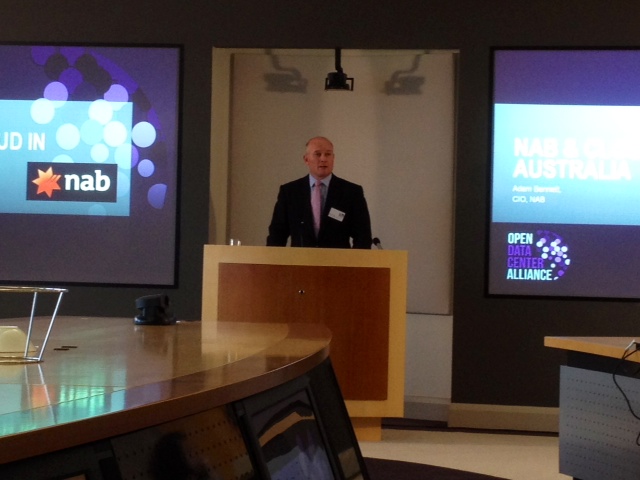NAB, BMW show off cloud standards progress

The University of Melbourne has joined NTT Data and over 300 other companies collaborating on standards to help businesses specify their cloud-computing requirements under the auspices of user-focused group the Open Data Center Alliance (ODCA), the group announced today as it celebrated its first anniversary in an update briefing in Melbourne.

Adam Bennett
(Credit: David Braue/ZDNet Australia)
Highlighting its achievements over its first year, BMW Group vice president of IT infrastructure Mario Müller — a member of ODCA's board of directors — demonstrated a tool called the Personal Engine Assistant Tool (PEAT), based on a standardised mark-up language that allows businesses to standardise their cloud-computing requirements when sending out requests for proposal (RFPs). Users simply tick appropriate boxes based on their business needs, and PEAT generates a description of their cloud-computing requirements that can be given to potential suppliers so they know exactly what services are required.
"These are available so you can get real [results] out of the ODCA," Müller said. "They can be used in companies and organisations now — and this is a great result for a little bit more than a year of work in the ODCA as a customer-voiced organisation."
Although the ODCA membership includes vendors like Intel and Capgemini, large companies like BMW, China Unicom, Lockheed Martin, the National Australia Bank, UBS and more are also represented, which participants said give the organisation a different tone than that often set by technology-focused vendors. This has allowed ODCA to focus less on esoteric technical standards and more on the maintenance of business-oriented "usage models" — eight have already been published — that will guide members towards best-practice cloud deployments.
NAB CIO Adam Bennett said the consultative nature of the ODCA effort had given it legitimacy and relevance as a forum for setting cloud interoperability standards. "It's very seldom you get a chance to get in at the ground level and shape how something as important as the cloud is," he explained. "That's one of the reasons we were very happy to get involved with the ODCA: it does represent the customer perspectives of the members of ODCA and not just the vendors — who, whilst they have a legitimate view on how cloud computing develops, it is a different view."
As its membership has grown, however, so too has the scope of ODCA's work. Other ODCA priorities being addressed in the group's usage models include such issues as interoperability between virtual machines, assurance, compliance monitoring, IO control to provide network quality guarantees, and carbon footprint calculation.
Another key effort will be the standardisation of cloud security requirements, which Bennett envisions as ultimately coalescing around several layers: basic (bronze), enterprise (silver), financial services (gold) and military-level services (platinum). "We very much recognise the importance of security standards and we want to inject our own contribution into that," Bennett said.
By building on the collective experience of large businesses as they experiment with various cloud models, the group's members hope to encapsulate business best-practice and set guidelines that bridge what has often been a yawning gap between business and IT requirements.
The University of Melbourne, which has joined ODCA as a contributing member, will be able to bring both corporate and research expertise "to help us get those usage models done", Müller said. "The ODCA was created to help make cloud and IT Purchasing decisions easier for end users by ensuring that everyone was speaking the same language and applying the right standards."
With a growing membership under its belt and a growing roster of activities planned, the ODCA will bring together cloud proponents for Forecast 2012, a one-day forum in New York City in June that will highlight success stories made possible by the ODCA's work.